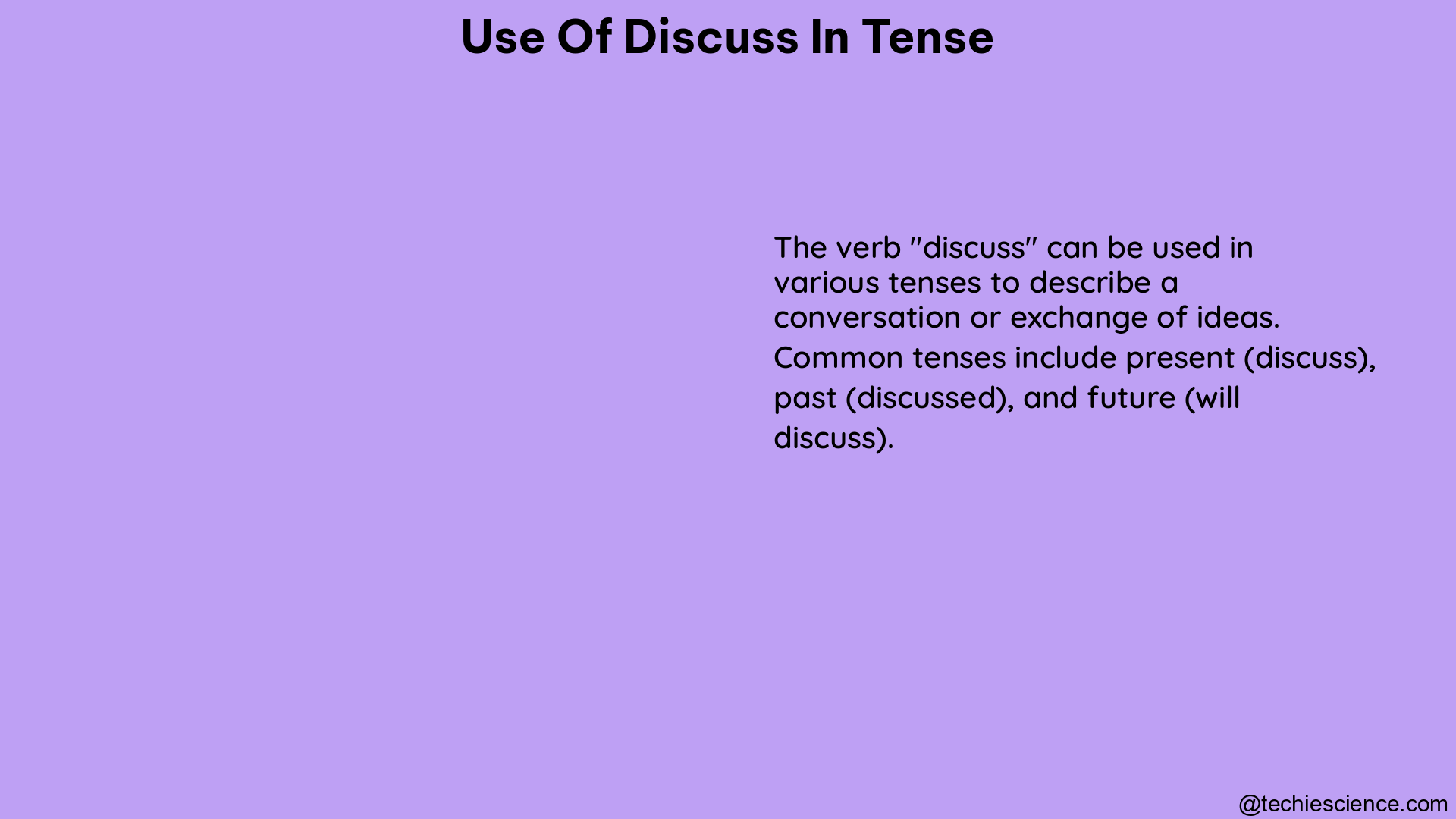The use of the verb “discuss” in various tenses is a crucial aspect of English grammar that can often confuse even the most proficient language learners. This comprehensive guide will delve into the nuances of using “discuss” in different tenses, providing you with a thorough understanding of its grammatical specifications and practical applications.
Infinitive Form
“Is to Discuss”
The infinitive form “is to discuss” is used to indicate an intention or expectation to discuss something in the future. This construction suggests that the action of discussing is planned or anticipated, rather than an immediate or ongoing event. For example, “The proposal is to be discussed extensively in the meeting” implies that the proposal is scheduled to be discussed in the upcoming meeting.
Present Tense

“Discusses”
The present tense form “discusses” is used to describe habitual or regular actions. This means that the verb “discuss” is employed to convey a recurring or customary behavior. For instance, “She always discusses her travel plans with her family before booking any tickets” suggests that the action of discussing travel plans is a consistent practice for the individual.
“Is Discussing”
The present continuous form “is discussing” is used to describe ongoing actions. This form emphasizes that the action of discussing is currently taking place or in progress. For example, “I am discussing my plans with my family every Sunday” indicates that the discussion is happening at the time of the statement.
Past Tense
“Discussed”
The simple past tense form “discussed” is used to describe completed actions in the past. This form is employed to convey that the action of discussing has already taken place and is no longer ongoing. For example, “We discussed the plan thoroughly but couldn’t reach an agreement” suggests that the discussion of the plan has been concluded.
Past Participle
“Discussed”
The past participle form “discussed” is used to describe actions that have been completed at an unspecified time in the past. This form is often used in conjunction with auxiliary verbs, such as “have” or “has,” to create perfect tenses. For instance, “The topic has been thoroughly discussed in the meeting” indicates that the discussion of the topic has been completed, but the exact time is not specified.
Perfect Tenses
Present Perfect: “Has Discussed”
The present perfect form “has discussed” is used to describe actions that started in the past and continue to the present. This construction suggests that the action of discussing is ongoing or has a connection to the current time. For example, “I have discussed it with him already” implies that the discussion has taken place and is now complete.
Past Perfect: “Had Discussed”
The past perfect form “had discussed” is used to describe actions that occurred before another action in the past. This form is employed to establish a chronological sequence of events, where the discussion happened before another past event. For instance, “I had discussed it before he arrived” indicates that the discussion took place prior to the arrival of the other person.
Common Mistakes
Misusing Past Simple
One common mistake is confusing the simple past form “discussed” with the past participle form. This can lead to incorrect usage, such as using “discussed” as the past participle form for other verbs.
Misuse of Past Participle
Another common mistake is incorrectly treating “discuss” as an irregular verb and creating non-existent past participle forms, such as “discused” or “discussed.”
Omitting Auxiliary Verb
Learners may also make the mistake of omitting the auxiliary verb “have” or “had” when forming perfect tenses, leading to incorrect constructions like “I discussed it with him already” instead of “I have discussed it with him already.”
Special Contexts
Academic Writing
In the results and discussion section of academic papers, the use of tenses can vary. The past tense is generally used to summarize findings, while the present tense is employed to interpret results or describe their significance. The future tense may be used for recommendations or future directions.
Examples
Habitual Actions
“I discuss my plans with my family every Sunday.”
Instructions
“First, you discuss the matter with the team, and then you report back to me.”
Commentaries
“Here he comes, and he discusses the plan with such enthusiasm!”
References
- https://english.stackexchange.com/questions/185368/it-is-to-be-discussed-what-is-the-infinitive-doing-in-this-sentence
- https://promova.com/past-tense-of/discuss
- https://www.wordreference.com/conj/enverbs.aspx?v=discuss
- https://www.editage.com/insights/which-tense-should-be-used-in-the-results-and-discussion-section-of-a-paper
- https://ell.stackexchange.com/questions/239561/is-to-discuss-is-discussing-discusses-when-to-use-which

Hi…..I’m a graduate with a Bachelor’s degree in English Literature. I wish to do a Masters in the same field someday and continue my career in Academia.
Let’s connect through LinkedIn: